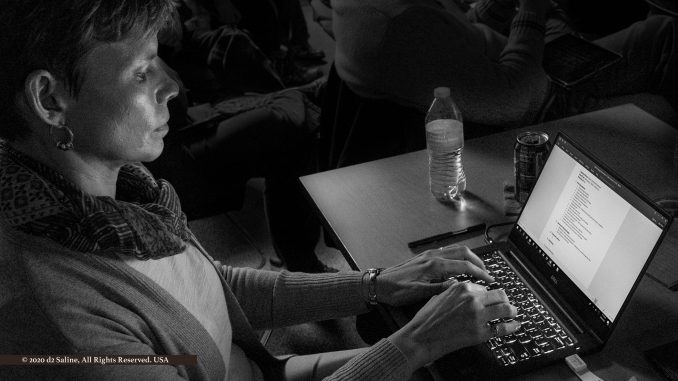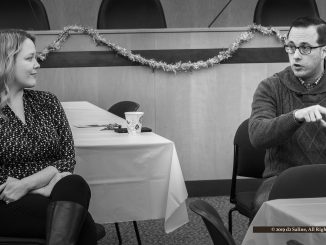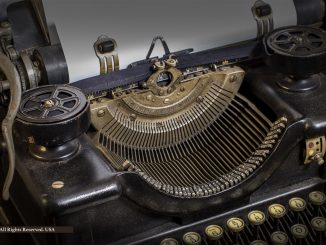
In 1895, HG Wells wrote of an inventory who traveled some eight hundred thousand years hence in The Time Machine. When The Time Traveler found himself standed in what he found to be a quite frightening future, he sought refuge in a spectacular structure that at first reminded him of a museum. [1,2]
Upon further exploration, he exclaimed it more likely “a library!”
While Saline District Library does not have its eye on anything near that far down the line, its administration is keenly aware of the importance communities place on facilities such as this. In fact, our library is actively committed to maximizing its own role in that regard here.
Whether or not reports on the death of libraries have been greatly exaggerated depends upon timing, sources, and headline you happen to reference. Some argue confusion surrounding the very definition of “library.” The American Library Association seems to suggest that it’s largely a matter of perspective. [3-13]
In 2016, there were 1.4 billion in-person visits to public libraries across the US, the equivalent of about 4 million visits each day. That’s roughly 2,664 per minute.
Americans go to public libraries (1.35 billion visits) more often than they go to the movies (1.24 billion admissions)
There are more public libraries (16,568) than Starbucks cafés in the US — a total of 16,568, including branches. Nearly 100% of public libraries provide Wi-Fi and have no-fee access to computers.
Applying structure and authority to the question, Pew Research Center has regularly revisited the subject of library uses and value as guaged by American perception. “Most Americans view public libraries as important parts of their communities,” it reported in 2016, “with a majority reporting that libraries have the resources they need and play at least some role in helping them decide what information they can trust.
[Around] three-quarters (77%) say that public libraries provide them with the resources they need. And 66% say the closing of their local public library would have a major impact on their community, although notably, just 33% say this would have a major impact on them personally or on their family.
A majority of Americans feel libraries are doing a good job of providing a safe place for people to hang out or spend time (69% feel libraries contribute ‘a lot’ to their communities in this regard) ….
And roughly half think their libraries contribute ‘a lot’ to their communities in terms of helping spark creativity among young people (49%) and providing a trusted place for people to learn about new technologies (47%).
Some 48% of adults specifically visited a library or bookmobile in the past 12 months, a modest uptick from the 44% who said that in late 2015.
Inherent in these frequent referencs to “community,” of course, is the idea that libraries will differ from place to place in terms of how they serve their constituencies. This not only means variability in attention focused on legacy constructs, incubator of creative thinking, and service to particulars of local culture, but doing so within the confines of resource limitations. This is true even among those who manage to figure out the manage of growing their budgetary pies.
Saline District Library has risen to this challenge by retaining the services of experts from “Rethinking Libraries” Kimberly Bolan and Associates. This week, Managing Principal Rob Cullin out of Indiana and Principal Janet Nelson based in Wisconsin are on site to facilitate focus groups designed to gather data from a variety of local stakeholders for a report due to library stakeholders on April 4.
Some of the ten sessions will consist of participants based on common areas of engagement, such as those in municipal government or business. Some groups, such as the one held last night, were open to self-selection.
Sessions were opened by representatives of Saline District Library staff, who then exited to avoid even the appearance of a desire to skew input or influence interactions. Mr Cullin then led from the front of a darkened evening room, referencing set PowerPoint slides based on broad discussion areas; Ms Nelson made contemporaneous notes from an inconspicuous table at the back of the room. At several points it was clear why trained professionals are needed in order to get the best of what may be had of these opportunities.
Over the course of each ninety-minute gathering, Rob Cullin stepped up to gently move on from topics where it was clear that the lemon had been squeezed, as often as he had to prime the pump.
Due to the ongoing nature of this process, Saline Journal will not be getting into the particulars of any topic raised, how long it was discussed, or perception of consensus. However, there is an active survey accessible through the Saline District Library website for those who’d like to be heard notwithstanding meeting participation — and the library is actively soliciting participation through this channel. [22]
After collecting data onsite, Rethink Libraries will spend the balance of this month and on throughout March analyzing what’s been found and preparing a report. At a minimum, the goal is to help develop a five-year plan for resoure allocation and decision-making on behalf of Saline District Library. If practical, some elements of that might stretch out to a decade or more.
For those who fancy a future that extends many centuries beyond, Saline District Library has two copies of The Time Machine on its shelves.
References
- “The Time Machine by HG Wells” (2018) Project Gutenberg.
- “Review: The Time Machine by HG Wells” Matthew Selwyn (January 14, 2014) Bibliofreak.
- “New Trands: Are libraries still relevant in a digitised world” Shivangi Mishra (January 15, 2019) The Times of India.
- “The Week in Libraries: January 5, 2018” Andrew Albanese (January 5, 2018) Publisher’s Weekly.
- “Libraries are dying – but it’s not about the books” Simon Jenkins (December 22, 2016) The Guardian.
- “Fewer Americans Are Visiting Local Libraries — and Technology Isn’t to Blame” Robinson Meyer (April 14, 2016) The Atlantic.
- “Libraries are dying? Think again” Jareen Imam (April 14, 2014) CNN.
- “Are libraries finished? Five arguments for and against” Peter Jackson (February 4, 2011) BBC.
- “The End of Books and the Death of Libraries” Matthew J Bruccoli (February 2007) Against the Grain.
- “Reports of Mark Twain’s Quote About His Own Death Are Greatly Exaggerated” Emily Petsko (November 2, 2018) Mental Floss.
- “19 Secrets of Public Librarians” Lela Nargi (April 13, 2018) Mental Floss.
- “The Big Question: How are public libraries changing, and what does their future hold?” Arifa Akbar (September 29, 2009) Independent.
- “State of America’s Libraries Report 2019” American Library Assocition.
- “The Information Needs of Citizens: Where Libraries Fit In” Lee Rainie (April 9, 2018) Pew Research Center.
- “Most Americans — especially Millennials — say libraries can help them find reliable, trustworthy information” AW Geiger (August 30, 2017) Pew Research Center.
- “The secret mission that people yearn to have libraries address” Lee Rainie (April 3, 2017) Pew Research Center.
- “How People Fit Libraries Into Their Lives” Lee Rainie (March 30, 2017) Pew Research Center.
- “How the public grades libraries — and uses libraries” Lee Rainie (June 27, 2016) Pew Research Center.
- “The Puzzles Librarians Need to Solve – VALA2016” Lee Rainie (February 5, 2016) Pew Research Center.
- “Libraries 2016” John B Horrigan (September 9, 2016) Pew Research Center.
- Rethinking Libraries: Kimberly Bolan and Associates (home page).
- “Saline District Library 2020 Strategic Planning Community Input” (2020) Saline District Library.



